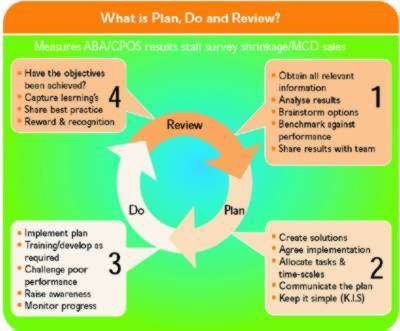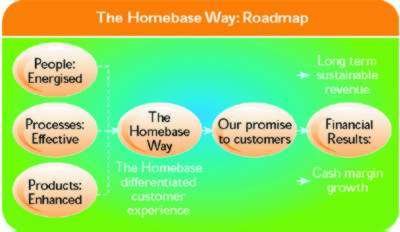Customer serviceis the whole activity of identifying customer needs in all their complexity, satisfying them fully, and keeping them satisfied. Customers are people who buy products and services from other people (usually companies of one sort or another).

This Case Study shows how Homebase, one of this country’s best known retail chains, places customer service at the heart of its values, demonstrating practical examples of how customer service can be applied to the benefit of shoppers.
Homebase became part of Argos Retail Group (ARG) in November 2002. Homebase is No.2 DIY retailer in the UK. It serves 1.5 million customers weekly in nearly 300 stores countrywide. For more than two decades, consumers – and businesses – have trusted Argos and Homebase to provide consistently top-quality products at competitive prices.
Today, Homebase offers more than DIY; it is a contemporary home and lifestyle store. Customers can choose from thousands of products. There is everything you would expect and more – for example, practical yet stylish furniture and exclusive, designer-led product lines such as the Linda Barker range of bed linen and wallpapers.
The acquisition of Homebase was an important step for ARG as part of an overall strategy of growing the business, including building up a bigger customer base through customer service.
Culture
The culture of an organisation is the way that it and its people behave. For example, when you enter a Homebase store you should immediately be able to get a feel for this culture because the people that work there as they create a warm and friendly atmosphere. This is not surprising because Homebase has deliberately created a customer focused culture.
The culture of an organisation is strongly influenced by senior managers. The culture developed, is shaped by their attitudes and the systems and patterns of behaviour that they encourage. When ARG took over Homebase it focussed on developing a senior management team with the capability to deliver a customer facing culture.

Homebase’s business objectives place great importance on providing customer service. The actions of staff are then aligned (put into line) with meeting this objective by providing customers with the best possible shopping experience.
An organisation needs to set out and communicate a set of values for its people, so they know what to do and how to act. Homebase’s values are:
- We put the customer first.
- We succeed through teamwork.
- We make it easy.
- I make a difference.
Such values provide clear guidelines, which give basic operating principles for the way in which Homebase people can and should behave.
The values are also highly motivating because they place a strong emphasis on teamwork and the role that individuals play in teams. This is demonstrated by the Homebase Retail Staff Award and the Homebase Recognition Award – see sections 04 and 05 for more details.
Homebase gives further guidance to its employees on appropriate behaviour, by setting out the following guidance in so called ‘Buzz sessions’ (teamwork training sessions):
- The customer is our No.1 priority.
- Look after our customers and they will look after us.
- Everything we do must benefit the customer.
- Treat customers as you would expect to be treated yourself.
- Listen to our customers and go the extra mile.
- We never want any customer to have a wasted journey.
Building an improvement strategy
An organisation’s strategy is the plan to achieve desired objectives. A continuous improvement strategy is one that involves constantly seeking to make improvements, however small.

The organisation that continually makes improvements keeps ahead of its rivals. Homebase emphasises continuous improvement – seeking to identify and then deliver new and better ways of meeting customer needs. The review/plan/do approach is used at every level in the Homebase organisation.
The review stage involves looking at current performance, identifying what the organisation and its people need to keep doing and what needs to be changed.
The planning stage involves first being clear about what should be achieved and then organising thoughts, actions and people. Planning is systematic rather than a random process and must be fitted into a clear time frame.
Finally, the do stage, involves carrying out the plan. The skills of the organisation and its people must be organised to make each part of the plan work. Once the plan is being implemented it is possible to carry out further review stages – creating a further improvement cycle.
The next stage of review, therefore is to:
- compare what was achieved (results) against the plan
- decide what the organisation and its people would do again/not do/do differently
- include these decisions in future plans.
The review/plan/do cycle helps Homebase to achieve results and drives continuous improvement. It embeds the values of the organisation in every one of its stores. It is important to have a clear sense of direction, time spent planning is time well spent. Reviewing is important, if ongoing improvements are to be made.
The importance of customer service research
Homebase places much emphasis on customer service. To improve this, it is essential to have a clear picture of what customers expect. There are two main types of customer research.
Quantitative research
This involves collecting information from an appropriate sample of shoppers to find out what their views are about Homebase and the customer service that it offers. An important source is a postal survey which Homebase conducts amongst a sample of Spend & Save loyalty card holders. This is done three times a year to gauge satisfaction with, and loyalty to, Homebase.

The survey allows Homebase to monitor satisfaction over time and highlight any areas that may be causing customers problems. Homebase is then able to analyse the frequency of problems relating to store customer service, and other details such as product range and delivery service.
Qualitative research
This typically involves smaller scale research about values and views rather than hard facts. For example, qualitative research involves interviewing small groups of customers to find out what their views are of customer service at Homebase.
Another, important approach which uses both qualitative and quantitative analysis is the Mystery Shopping Programme. Homebase conducts a monthly programme of mystery shopping. All stores are measured on three key areas.
1. Store standards: Presentation of the store and its staff.
- Is the store well maintained?
- Does the store make it easy for customers to shop?
- Are sufficient staff available to help?
- Are staff approachable?
2.Enquiry service: Are colleagues offering the right level of service to customers if they have a query?
- Do staff members greet customers?
- Do they take customers to the relevant aisle?
- Do they stay with customers until they have what they need?
3.Goodbye and lasting impressions: Do customers leave with a strong impression?
- Are sufficient tills open to fulfill demand?
- Are customers greeted in a friendly manner?
- Is the transaction processed smoothly?
The Mystery Shopping Programme is a key tool for stores to use to improve the service they offer to customers. Scores achieved by a store also act as the trigger for the Homebase Retail Staff Award; a quarterly bonus scheme paid to store staff achieving certain criteria. Additionally they count towards the management annual bonus scheme.
Using a range of research tools to find out about customer satisfaction is important to Homebase. For example, different Mystery Shoppers will visit stores over a period of time and the results will be compared. In addition the results of customer surveys can be compared and contrasted with the results provided by Mystery Shopper Reports.
Empowering staff to plan and do
Empowerment is the process of giving greater responsibility to everyone that works for an organisation – it literally means giving power to make decisions. Empowering members of an organisation is a tremendous motivational tool because they feel that they are contributing, through their own initiative, to improving performance and achieving better results.
Homebase employs a teamwork approach in which everyone counts and adds value to their team. All employees are given an opportunity to voice their ideas and opinions. At Homebase employees are organised into teams with a team leader. Team meetings are held on a regular basis called ‘huddles’. Huddles frequently involve team building exercises and fun activities such as quizzes and competitions (such as trolley dashes to locate stock in a store).
In addition the huddle is a way of encouraging everyone to contribute to developing ideas for improving processes within the business. For example, the team leader may identify an area of weakness that has come to light as a result of a visit by a Mystery Shopper or from the customer satisfaction survey. The team leader might read out comment cards or relay verbal comments. Individuals are then invited to suggest ways of improving customer service in the coming week. Team members are encouraged to suggest ideas for a range of ways to improve business such as how to improve sales, and general processes.
Senior managers at Homebase recognise the importance of empowerment because grassroots employees are best placed to understand and be able to respond to the needs of customers at a local level – for example by being able to cater for regional differences. Empowering staff involves encouraging employees to make appropriate ‘on-the-spot’ decisions such as offering to help a customer take and unload a trolley of goods to their car, or replacing product labels on products when they are missing (without having to wait to be told what to do).
The general philosophy of Homebase’s teamwork approach for employees is called ‘I make a difference’ and is that they should:
- take personal responsibility
- have a ‘can do attitude’
- if something isn’t right, do something about it – don’t leave it to someone else
- confidently own every situation and deal with it
- give praise and recognise everyone’s contribution.
In addition staff may receive one of the Homebase Recognition Awards. These are awarded to staff for going above and beyond the call of duty in delivering customer service and living the values, the awards are bronze – star, silver – hero and gold – legend, which is the ultimate achievement with only 16 gold awards across the entire company, each award winner receives a certificate, limited edition pin badges and leisure vouchers which can be used in a variety of outlets.
Empowered employees have much higher levels of motivation, they enjoy their work, and their loyalty to and pride in Homebase is enhanced. Highly motivated employees in turn will help the organisation to achieve its objective of putting the customer first.

Of course, as a business, Homebase is best placed to create the high financial returns that shareholders in the company are looking for. This inter-relationship between people, processes and products to the benefit of the customer is illustrated by the Homebase Roadmap.
Conclusion

Homebase is committed to customer service. Customer service lies at the heart of our modern economy because we increasingly make choices on the basis of how we are served.
Excellence in customer service can only be fully achieved by having an organisational culture and value system which places the customer at the heart of everything that an organisation and its people do.
Homebase has embedded this culture of customer service by giving high priority to a customer service emphasis from top management right down to the operational team level. At the heart of a continuous improvement cycle is the review/plan/do cycle which provides a tool for improving customer service at every level within the organisation.
